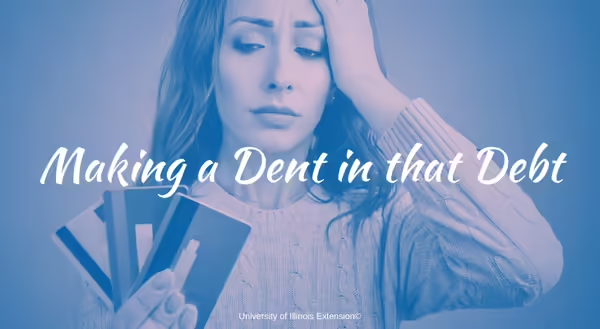
2019 was a year that most of us seemed to want to forget… but you know the one thing you can’t forget from last year. That debt you may have racked up.
Debt, it feels like such a nasty word. For a lot of us, debt seems to follow us around like a bad habit. Debt defined is the money you owe to another person or business. For our January podcast – Camaya and I tackled this topic and wanted to give our listeners (and readers) some timely tips to help you make a debt in your debt.
Every quarter the New York Federal Reserve Bank follows consumer debt and releases their findings? A few key points about this latest release of information are:
- Non-housing balances increased by $64 billion dollars in the third quarter, this includes $18 billion in auto loans, $13 billion in credit card balances, and $20 billion in student loans.
- A small percentage of debt is seriously delinquent (90 days late or more) at only 4.8 percent, but of that 66 percent of late payments are credit card and student loans.
Plus having debt makes us STRESSED! From the American Insitiute of CPAs – 56 percent of Americans said that debt negatively impacted their lives. Another 28 percent said that their debt caused stress about everyday financial decisions.
How do we get rid of debt quickly?
While all of these are suggestions, some of them may not be feasible right now (and that’s ok!)
- Pay your balance in full – one of the quickest ways to eliminate debt is to pay it in full. Maybe use part of an upcoming bonus, tax refund or “extra” paycheck for the month.
- Pay more than the minimum – even if it’s a little bit more than the minimum, even $10 more a month to a payment can help reduce your time in repayment. (Plus the credit card act of 2009 makes your credit card company show you if you paid a little bit more, how it would help you, so check that out on your next statement)
- PowerPay your debt – www.powerpay.org is a wonderful website and tool that can help you eliminate your debt faster. The concept is simple. Once you are done paying off one bill (of many) allocated the funds from the paid off bill to another balance that you owe on. Example: If you were paying $100/month on credit card #1, and you pay if off, take that $100 and put it towards credit card #2.
- Negotiate with your creditor for a lower interest rate – one of the best sayings I’ve ever heard is if you don’t ask, the answer is no. What could it hurt to ask if you could get your interest rate lowered?
- Reevaluate your Spending Plan – Cut expenses or add more income. While adding more income can be hard, it doesn’t have to be forever. Maybe picking up some additional shifts at work or getting a part-time job/side hustle to make some extra payments. Otherwise examine your spending and make some choices on what needs to go to help you accomplish your debt repayment.
- Advanced Level: Balance Transfer – This one has caution tape all around it. While it may be beneficial for some to get a zero percent balance transfer, you have to make sure you have the motivation and strength to not use the newly zeroed out card. For some, the temptation is too high. Only you know what you can handle, but moving debt from a high interest rate to zero can save hundreds to thousands of dollars. Just be mindful of the transfer fee, and make the best decision by comparing balance transfer offers.
What if my debt is too much?
Debt can become overwhelming. We know it stresses us out and it can cause major fights with loved ones. Facing your debt head on can really help to evaluate where you are. For some, $1,000 can seem just as stressful as $20,000 in debt. Evaluate where you are by laying all of your debt out.
| Name of Creditor | Amount | Interest Rate/APR | Minimum Payment | Pay off Date |
Just by making a list, it can help you prioritize what you need to repay. What can you eliminate quickly?
You can always use the resources nearby as well. If you live in Illinois, you can contact a Money Mentor with the University of Illinois Extension. You’ll be able to sit down one on one with a mentor and discuss your concerns. Also, you could seek help from the National Foundation for Credit Counseling - www.nfcc.org (there is a small fee for their services, but they help individuals all the time with their debt!)
Make 2020 the year you make a huge dent or completely eliminate your debt. Hopefully these tips can help you get jumpstarted on a year of financial wellness.
**For those of you who are regular listeners of podcast, Family Financial Feuds, we’re doing a listener survey. If you have listened to a podcast in the last 14 months, please fill out our quick 3 minute survey at https://go.illinois.edu/FFF_ListenerSurvey**